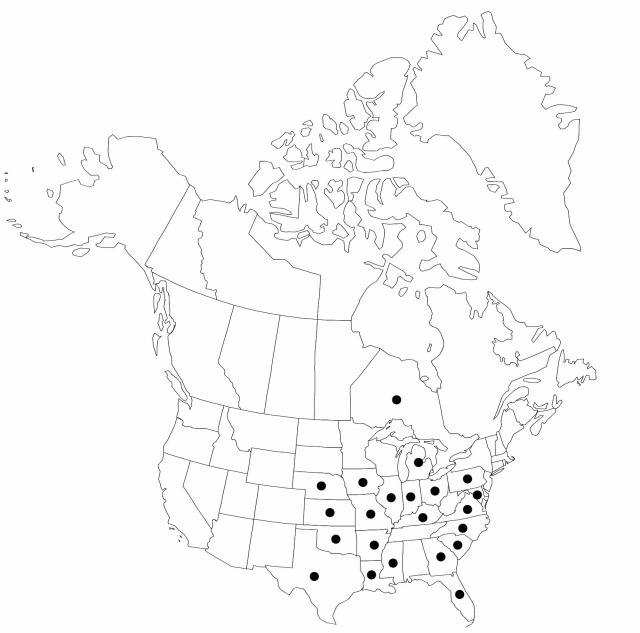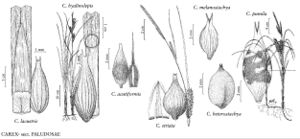Carex hyalinolepis
Syn. Pl. Glumac. 2: 235. 1855.
Plants colonial; rhizomes long-creeping. Culms central, coarse, trigonous, 40–110 cm, smooth. Leaves: basal sheaths pale green to brownish or pale red tinged, base with marescent remains of previous year’s leaves; longest ligules 2–10(–12) mm, less than 2 times longer than wide; blades glaucous, flat to V-shaped, (4–)5.5–13 mm wide, glabrous. Inflorescences 15–50 cm; proximal 2–4 spikes pistillate, ascending to arching; distal spikes erect; terminal 3–6 spikes staminate. Pistillate scales lanceolate to ovate, apex obtuse to acute, glabrous, awn 0.9–8.5 mm, scabrous. Perigynia ascending, obscurely 10–15-veined, veins somewhat impressed, narrowly ovoid, (4.5–)5.5–7.7 × 1.6–3 mm, glabrous; beak obscure, 0.9–1.7 mm, bidentulate, teeth straight, 0.4–0.8 mm.
Phenology: Fruiting Apr–Jul.
Habitat: Swamp forests, river bottoms, shores of streams, ponds and lakes, wet meadows, often in clay soils, seasonally moist sites
Elevation: 0–400 m
Distribution

Ont., Ark., Fla., Ga., Ill., Ind., Iowa, Kans., Ky., La., Md., Mich., Miss., Mo., Nebr., N.C., Ohio, Okla., Pa., S.C., Tex., Va.
Discussion
Carex hyalinolepis is abundant in the Mississippi lowlands and often dominant in the understory of open, wet floodplain forests and bottomland meadows. It is a rapid invader of ditches and other disturbed areas. Sometimes extensive stands are seen without fertile culms.
Occasionally, Carex hyalinolepis hybridizes with C. pellita (= C. ×subimpressa Clokey, according to A. A. Reznicek and P. M. Catling 1986), and rarely with C. lacustris. Carex ×subimpressa is sufficiently frequent that it has been treated as a species in some floras. It can form large colonies in suitable sites.
Selected References
None.
